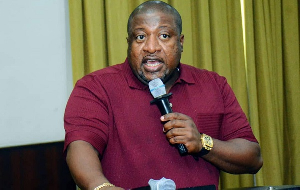Our country is making progress on many fronts. Many of us still complain of difficult economic conditions and the poor performance of our leaders. But it is not true that our country is at a standstill or getting backwards as some people will want us to believe. Anybody who has been outside the country for a few years will get back to see a few things that have become better. And if you haven’t gone home for ten years, you should be prepared for a shock the next time you make it.
When Ghanaians complain about our deplorable conditions, it is mostly because we believe that, given our natural resources and our experience as a nation, we should be doing far better than we have done so far. It is this comparative attitude, implicit though it may be, that irks so many of us. How can a country so rich, still be so poor in so many things?
But, yes, we have made some progress. The world, itself, has made a lot of progress. And we have followed. Even if we have been rather lethargic, the strides made by the world are enough to carry us along – some of the way. We have not closed ourselves to the rest of the world and there are millions of Ghanaians living outside the country who still care a lot about the motherland. In our country, some of this progress has been turned on its head and provides a lot of humour for the one inclined to see them.
One of the “progress” areas you will see in Ghana today is the availability of vehicles. We have more vehicles today than at any previous time of our history. It seems that that crazy love of the motor vehicle that gripped the advanced countries in the 50s and early 60s is only now coming to Ghana. Middle class Ghanaians are now showing a love of cars that can be likened to a person who was too poor in his infancy to possess the cheapest toys but is now old and is able to buy whatever toy he likes. Even those Ghanaians who can’t quite afford it are pouring all their meagre resources into possessing a car.
The possession of a motor vehicle is still a prestigious thing in Ghana, though. Those who can afford it first get a small one. Then they add a second bigger one (because everyone else has one). When they see that everybody in their class has two, they go for a third, and a much bigger, one. You see, it is not enough to keep up with the Joneses. You have to leave them behind you.
Anyone who has a love affair with the motor vehicle also takes pride in his ability to drive. Ghanaians are no exception. Many of them can handle the vehicle. But most of them can only drive in a Ghanaian way. That is not saying much. The many driving schools around the country churn out, like the universities, poor drivers who are given licences on their first attempts at trying. Many professional drivers in Ghana are adept at manoeuvring huge vehicles in tiny spaces but once they get on the road, they seem to obey their own rules. Many of them will fail a driving test in Europe without extensive re-learning!
Even the most experienced drivers in Ghana do not know the commonest driving rules that are observed in the rest of the world. Three come readily to mind. Many do not know the difference between Yield (the upturned red triangle at which you are only requested to give way) and STOP (the red octagon with a white STOP inscription that requires you to stop before proceeding). Many confuse the No Stopping (the red X on a round blue background) with the No Stopping No Parking (the diagonal red line on a round blue background) signs. They don’t know that the white unbroken line markings on multi-lane roads should not be crossed when changing lanes. The interesting thing is that the foreign construction companies that built our new roads furnished them with all these internationally agreed on signs but Ghanaian drivers completely disregard them.
The story is told (it may be apocryphal), of a petrol company that tested Ghanaian drivers’ knowledge of road signs. An experienced professional driver said the sign warning drivers to beware of wild animals crossing the road meant there was a fufu bar around the corner serving bush meat. Another said the sign warning of a curved road ahead meant there were snakes in the area!
There are bus and bicycle lanes in the cities but nobody respects them. Drivers have absolutely no patience for non-motorised road users which makes cycling in the cities very dangerous.
There are many driving schools, especially in the major cities. It is obvious that some of the driving school instructors are not very well versed in modern traffic regulations. Some teach their students the wrong things. For instance, they insist that their charges learn to change gears strictly in numerical order even though modern vehicles are designed for gears to be changed in any order. There is a theory book that can be absorbed in one sitting. It is difficult to fail a driving test in Ghana.
The cars used to train new drivers are often old and battered. L is the learner’s identification sign in traffic. These are affixed to the learner’s vehicles, which can be used by their owners even when they are not teaching someone to drive. If you see a car marked with L in traffic, you cannot be sure if a lesson is going on.
There is no distinction between a driving licence for shift gear vehicles and one for automatic gears. Anybody can learn to drive using automatic gears, get his or her licence, and drive shift gear cars.
The traffic policeman in Ghana is a topic worth an article on its own. When Ghanaians talk of corruption, they think first of the police officer standing by the roadside getting bribes from drivers. And they are right. This is still going on like of old. In Ghana, the police cannot issue instant fines for minor traffic offences. Every little offence requires an arraignment before a court of law. If you are caught driving ten kilometres above the speed limit, the proper arrest procedures is to be arraigned before a traffic court. There is no option of an instant fine (probably because we have no proper statistics of vehicles and their owners and anybody given a fine will bolt away without any consequences). The process of being arraigned before a court is a tedious one. It is far easier to pay a bribe than to undergo that process.
Driving licences last only two years in Ghana after an initial period of six. The police know many motorists forget to renew and simply turn this into a gold mine. The two year limit may have been established as a revenue source for the vehicle authorities but that has been turned into a source of income for the traffic police.
The manner in which the police demand bribes is often funny. These days they simply appeal directly to you to give them something to buy “credit” for their mobile phones. They can even negotiate with you on the bribe you should pay. When my brother was caught driving over the speed limit, he decided to escape with a ten cedi bribe. But he found only a five cedi note and a one cedi one in his wallet and had nothing else on him. He sought desperately for some more cedis to make the ten cedi mark. The police officer saw his frantic efforts, took pity on him, and asked him to “just give us the five cedis and forget the one cedi”. On another occasion, a university student was caught on some traffic offence in Accra over a weekend. The student pleaded with the police officer telling him all he had left for the weekend was a twenty cedi note and asking if they could not split it. The officer agreed, took the 20 cedi note and duly gave him a change of ten cedis and released him. The only thing that was lacking in the transaction was a receipt so the student was unable to see how much VAT he had paid for the “service” he was rendered!
Last year, it was an offence to talk on your phone while driving. The police arrested you but let you off for a bribe. That law is still on the statutes but is now completely ignored. The police have so often received bribes instead of prosecuting offenders that the law has lost its meaning. It is no longer enforced as the police look for other means of lining their pockets.
It is not beyond a Ghanaian traffic policeman to arrest you for driving without a licence and then sit in your vehicle and ask you to drive him to the police station so that he can complete your arrest.
What the police in Ghana hate most is anything you say that they regard as an affront to their authority. They don’t like that. But, even as they are throwing their weights about, they look for signs to see if you are a top government official, a lawyer or anyone in authority over them who can make trouble for them.
Often we blame Ghanaian policemen for being corrupt, and blame them some more. But we forget that they are also victims of a system in which they are really underdogs. If corruption involving huge sums of money did not exist at the top levels of government and in the civil and public services, the lowly placed policeman on some desolate road in Asankragwa or Sogakofe would never think of collecting a bribe which he shared with his superior officers. We can never stop corruption in Ghana by attacking the policeman on the road. He, too, is a victim!
There are more models of vehicles in Ghana than in many European countries including those with long traditions of car making. Anybody can import any car from any part of the world to Ghana. The only restriction is the payment of a penalty if the vehicle is more than 10 years old. But often, this is not a deterrent to Ghanaians. This free-for-all results in all kinds of car models on our roads many of which don’t have any service networks around the country. Local mechanics (fitters) using their third world ingenuity are always ready to tinker with your car and make repairs to the best of their knowledge. Sometimes, this is not pleasant experience.
Most cars plying our roads are second hand ones sent from USA or Europe. The Ghanaian prefers a second hand car directly imported from Europe or America (the so called “home second hand”) to one that had already been driven in Ghana. There are virtually no roadworthiness tests of vehicles in Ghana. The mere fact of your being able to drive the car to the test centre can be taken as sufficient proof of its roadworthiness! No wonder that most of the fatal vehicular accidents that occur on our roads are avoidable ones.
The streets in Accra, Kumasi and elsewhere and some roads across the country are being rebuilt in modern ways. Work may be slow on many of them but they are getting ahead. The fact remains, though, that, as one of the infrastructural bedrocks of our economy, the country’s roads are in very bad shape. The more interesting thing is that even the good roads are not being properly used. Road directions are poor especially in the major cities. If you do not already know the way to a place, you will be in big trouble. You won’t get any help from the road directions. GPSs don’t quite work well. There’s a diversion on the Tema Motorway driving from Accra. Unless you are already aware of this fact, you won’t know it until the very moment you reach the spot where you have to exit the motorway.
The George Bush Highway is, strictly speaking, not a highway in the common sense of the word. There are traffic lights, intersections and direct accesses to properties. Then there are the ubiquitous pedestrians crossing the road wherever they like and others selling all kinds of things to motorists caught up in the “go slow”. Drivers change lanes as soon as they see the slightest gap in traffic. Many drive slalom on this road. Nobody arrests anybody for dangerous driving.
The average Accra resident spends hours in daily commute. The president and other top politicians use sirens and outriders to clear the road for them. At times, ambulances put on their sirens only because they want to beat the traffic, not because they have patients in need of urgent medical care.
Traffic lights are becoming a prestige thing in Ghana at a time when many European cities are transforming traffic light junctions to the safer roundabouts. There are traffic lights all over Accra and in many district capitals. Dumsor makes sure some of these don’t work all the time. Even those that work cannot cope with the rush hour traffic and policemen are still needed to control the flow of traffic.
The young middle class Ghanaians (Ghana’s yuppies) zooming around today in their fast cars and SUVs will not know of a time when we followed British tradition and drove on the left. Vehicles that were imported into the country from continental Europe or North America with the steering wheels on the left were the odd ones out and had to have warning signs behind: “Left-hand drive. No hand signals”. And when you left Ghana to any of our neighbouring countries, you were met with the sign: “You are entering (Togo, Upper Volta, or Ivory Coast). Drive on your right”. On your way back, it was: “Vous entrez au Ghana. Conduisez a gauche”. But that was the time before “Enyinfa enyinfa naaranyin…” changed it all on Sunday, August 4th, 1974.
Today in Ghana, outside the major cities, the roads are so bad that motorists do not drive on the right. They drive on the patch of road they judge as good to drive on. This is not necessarily on the right side of the road. On less trafficked roads, this is not a problem. But when you meet an oncoming vehicle, you have to force yourself to the right so that you can meet the vehicle on the correct side. Ghanaians often observe this rule. But not always. If the vehicle ahead of you is trying to dodge pot holes or bad patches, and you are in a huge SUV that easily clears these hardships, you can overtake the smaller car on the wrong side and drive away leaving him behind.
Those Ghanaians who have stayed outside the country for a long time and acquired different driving habits learn to quickly revert to the rhythms of the old ways. In a country where many drive haphazardly, the lone good driver is the one most likely to cause an accident. So, you end up doing exactly what the rest are doing.
Of all the traffic regulations that Ghanaian motorists disregard, the zebra or pedestrian crossing is the most important and most serious. It is a pity to see pedestrians in Accra standing at these crossings waiting for the cars to stop for them. Yes, in Ghana, it is pedestrians that give way to motorists on pedestrian crossings! It was on one such badly placed pedestrian crossing at the big Madina junction that yours truly was nearly whacked off by a speeding car rushing to cross before the policeman stopped the traffic on his side. For one split of a second, I had forgotten that I was in Accra and sauntered on to the crossing without looking at the traffic. It was only a reflex action of mystical proportions that saved me. Ekaa keteketekete and I wouldn’t be here to bring you this story.
Kofi Amenyo (kofi.amenyo@yahoo.com)
Opinions of Saturday, 6 December 2014
Columnist: Amenyo, Kofi














